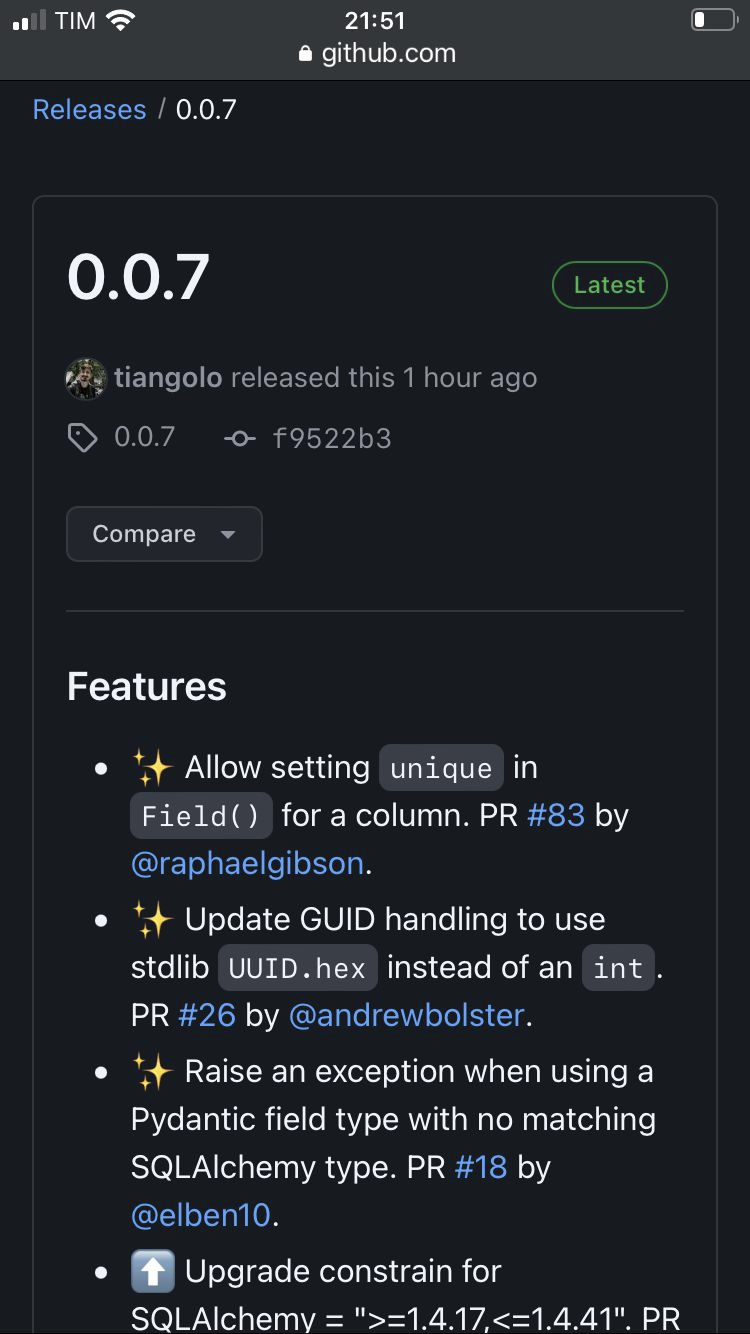Comments (14)
Why not simply add sa_column_kwargs={"unique": True} to Field()?
from sqlmodel.
Found a solution that I think is more elegant using table_args
from typing import Optional
from sqlmodel import Field, SQLModel, UniqueConstraint
class users(SQLModel, table=True):
__table_args__ = (UniqueConstraint("external_id"),)
id: Optional[int] = Field(default=None, primary_key=True)
email: str
from sqlmodel.
see #65 - it has the how to do it.
Basically you specify something like -
email: EmailStr = Field(sa_column=Column("email", VARCHAR, unique=True)) the = Field(sa_column=Column("username", VARCHAR, unique=True))
Thanks very much for your help, @obassett! Nevertheless, i have opened a Pull Request to use Unique constraint directly by the sqlmodel whithout using sa_column param.
PR: #83
from sqlmodel.
@Data-Mastery Honestly?... Nowhere! I had to dive (deep) into the source code of SQLModel to find it.
While the docs are really good in some aspects (very heavy on examples / guides / tutorials), the lack of a comprehensive API reference is very unfortunate.
from sqlmodel.
see #65 - it has the how to do it.
Basically you specify something like - email: EmailStr = Field(sa_column=Column("email", VARCHAR, unique=True)) the = Field(sa_column=Column("username", VARCHAR, unique=True))
from sqlmodel.
I had the same question, so just for documentation I put my complete example :)
Hope that can help someone.
So I had to define a list of product with an integer primary key id and a unique name for the products.
The class: BaseProduct is the default definition of the Product.
The class: Product is the DB model.
The file Product.py with the BaseProduct definition is
from sqlmodel import SQLModel
class ProductBase(SQLModel):
name: str
description: str
price: float
available: boolThe file: product.py with the definition of Product is
from typing import Optional
from sqlalchemy import String
from sqlalchemy.sql.schema import Column
from sqlmodel import Field
from app.src.schemas.entities import ProductBase
class Product(ProductBase, table=True):
id: Optional[int] = Field(default=None, primary_key=True)
# name is unique
name: str = Field(sa_column=Column("name", String, unique=True))Of course the relationship with ProductType and ProductTagLink are defined in another files and schemas :)
Hope this example helps :)
from sqlmodel.
It looks like the Field column now supports the unique=True/False keyword argument? Merged in #83
I was able to successfully use code: str = Field(index=True, unique=True) and it generated a CREATE UNIQUE INDEX IF NOT EXISTS ix_venue_code ... in the output schema
from sqlmodel.
@StefnirKristjansson not sure that the usage of table_args is more elegant, but it is certainly what I was looking for. This way you can define an actual UniqueConstraint that spans multiple fields (or columns, whichever terminology you prefer).
@sgraaf 's solution feels the most elegant one for single field constraints.
edit: However, both my statements are pure personal preference, no solid grounds on why they would be more or less elegant :)
from sqlmodel.
This isn't documented as it is a feature from SQLAlchemy, but you can define unique constraints at the model level using "table_args".
from sqlmodel import SQLModel, Field
from sqlalchemy import UniqueConstraint
class Employee(SQLModel, table=True):
"""Employee Model"""
__table_args__ = (UniqueConstraint("employee_id"),)
employee_id: int = Field(
title="Employee ID",
)
firstname: str = Field(
title="First Name",
)
lastname: str = Field(
title="Last Name",
)
So the above code would add a constraint to prevent duplicate entries in "employee_id".
I've only tested this on a PostgreSQL database, but it should work fine for others.
The benefit of doing it this way is you avoid having to override the column definition at the field level.
https://docs.sqlalchemy.org/en/14/orm/declarative_tables.html
from sqlmodel.
@sgraaf : Thank you, that works fine! Where is that "trick" documented?
from sqlmodel.
It looks like the Field column now supports the unique=True/False keyword argument? Merged in #83
I was able to successfully use
code: str = Field(index=True, unique=True)and it generated aCREATE UNIQUE INDEX IF NOT EXISTS ix_venue_code ...in the output schema
Yes, I have sent a PR with this feature after ask this question here.
from sqlmodel.
Was it removed? I am running sqlmodel version 0.3.0 and it is saying that it is not there in Field.
from sqlmodel.
Was it removed? I am running sqlmodel version 0.3.0 and it is saying that it is not there in Field.
Version 0.3.0? The latest version is 0.0.8, and the support for unique constraint was added on version 0.0.7
from sqlmodel.
Unique constraints can be created anonymously on a single column using the unique keyword on Column. Explicitly named unique constraints and/or those with multiple columns are created via the UniqueConstraint table-level construct.
from sqlalchemy import UniqueConstraint
metadata_obj = MetaData()
mytable = Table(
"mytable",
metadata_obj,
# per-column anonymous unique constraint
Column("col1", Integer, unique=True),
Column("col2", Integer),
Column("col3", Integer),
# explicit/composite unique constraint. 'name' is optional.
UniqueConstraint("col2", "col3", name="uix_1"),
)
from sqlmodel.
Related Issues (20)
- There is no unique constraint matching given keys (one-to-many, connecting with many-to-many tables) HOT 2
- Preparing for Pydantic v2 release HOT 13
- Data Integrity: Raise error on attempt to delete an object required via a Relationship HOT 8
- [Querying] negating `Model.boolean` in `where()` HOT 2
- [M2M] Query dependent incl. `link_model` fields HOT 3
- Could not refresh instance HOT 9
- SQLModel doesn't recognize Relationship between models HOT 1
- Get select with options (selectinload) using response schema HOT 2
- Dose there any better way to write timezone aware datetime field without using the SQLAlchemy ? HOT 3
- Obtaining `TypeError: Cannot pickle 'module' object` on models with many-to-many relationships HOT 2
- Order of columns in the table created does not have 'id' first, despite the order in the SQLModel. Looks like it's prioritising fields with sa_column HOT 3
- Erro ao executar uvicorn.run(...) HOT 1
- Many to many relationship between a table and itself HOT 6
- How to add current date time by default on a table declaration? HOT 13
- Add documentation about how to use the async tools (session, etc) HOT 5
- async relationship bug HOT 9
- 🚀 Roadmap HOT 28
- Internal link failed at create-db-and-table.md
- Field cannot autocompletion when its a SQLModel HOT 6
- Add an overload to the `exec` method with `_Executable` statement for update and delete statements
Recommend Projects
-
 React
React
A declarative, efficient, and flexible JavaScript library for building user interfaces.
-
Vue.js
🖖 Vue.js is a progressive, incrementally-adoptable JavaScript framework for building UI on the web.
-
 Typescript
Typescript
TypeScript is a superset of JavaScript that compiles to clean JavaScript output.
-
TensorFlow
An Open Source Machine Learning Framework for Everyone
-
Django
The Web framework for perfectionists with deadlines.
-
Laravel
A PHP framework for web artisans
-
D3
Bring data to life with SVG, Canvas and HTML. 📊📈🎉
-
Recommend Topics
-
javascript
JavaScript (JS) is a lightweight interpreted programming language with first-class functions.
-
web
Some thing interesting about web. New door for the world.
-
server
A server is a program made to process requests and deliver data to clients.
-
Machine learning
Machine learning is a way of modeling and interpreting data that allows a piece of software to respond intelligently.
-
Visualization
Some thing interesting about visualization, use data art
-
Game
Some thing interesting about game, make everyone happy.
Recommend Org
-
Facebook
We are working to build community through open source technology. NB: members must have two-factor auth.
-
Microsoft
Open source projects and samples from Microsoft.
-
Google
Google ❤️ Open Source for everyone.
-
Alibaba
Alibaba Open Source for everyone
-
D3
Data-Driven Documents codes.
-
Tencent
China tencent open source team.




from sqlmodel.